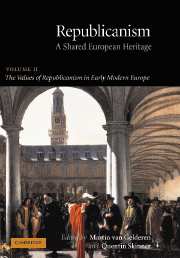Book contents
- Frontmatter
- Contents
- Contents of Volume I
- Acknowledgments
- Introduction
- Part I Republicanism and Political Values
- 1 Classical Liberty and the Coming of the English Civil War
- 2 Empire and Liberty: A Republican Dilemma
- 3 Republicanism and Toleration
- 4 The Mechanisation of Virtue: Republican Rituals in Italian Political Thought in the Sixteenth and Seventeenth Centuries
- 5 From Virtue to Politeness
- 6 From Civism to Civility: D'Holbach's Critique of Republican Virtue
- Part II The Place of Women in the Republic
- Part III Republicanism and the Rise of Commerce
- Bibliography
- Contributors
- Index of Names of Persons
- Index of Subjects
3 - Republicanism and Toleration
Published online by Cambridge University Press: 11 January 2010
- Frontmatter
- Contents
- Contents of Volume I
- Acknowledgments
- Introduction
- Part I Republicanism and Political Values
- 1 Classical Liberty and the Coming of the English Civil War
- 2 Empire and Liberty: A Republican Dilemma
- 3 Republicanism and Toleration
- 4 The Mechanisation of Virtue: Republican Rituals in Italian Political Thought in the Sixteenth and Seventeenth Centuries
- 5 From Virtue to Politeness
- 6 From Civism to Civility: D'Holbach's Critique of Republican Virtue
- Part II The Place of Women in the Republic
- Part III Republicanism and the Rise of Commerce
- Bibliography
- Contributors
- Index of Names of Persons
- Index of Subjects
Summary
Introduction
Toleration is not a concept usually associated with the history of republicanism. The emergence of a ‘modern’ concept of toleration, which implies the permanence of religious diversity, is commonly linked with the idea of the natural, i.e., inalienable, rights of men and is attributed to the tradition of Lockean liberalism. In this view, the individualistic model of toleration was fully developed in the Enlightenment period, when natural rights were invoked not only to legitimise liberty of worship, but also to advocate the liberty of thought and expression on which the development of the Enlightenment project depended. Not toleration, but rather the idea of ‘civil religion’ is considered to be a peculiar achievement of republican theory. It is well known that Rousseau introduced the term ‘civil religion’ to describe the civil ‘profession of faith’ that he modelled on the national religions of the ancients. Although republican conceptions of religion exercised an extensive influence mainly in the second half of the eighteenth century, especially in France, they can be traced to the re-articulation of republican ideals in the aftermath of the Glorious Revolution. This has been demonstrated by Justin Champion, who rightly insists that, in the period between 1680 and 1720, political issues cannot be separated from religious ones. His analysis of the relation between republicanism and deism leads to the conclusion that anti-clericalism played a crucial role in the republican analysis of the problems of civil government. However, he stresses that anti-clericalism did not imply irreligion.
- Type
- Chapter
- Information
- RepublicanismA Shared European Heritage, pp. 47 - 72Publisher: Cambridge University PressPrint publication year: 2002
- 7
- Cited by



